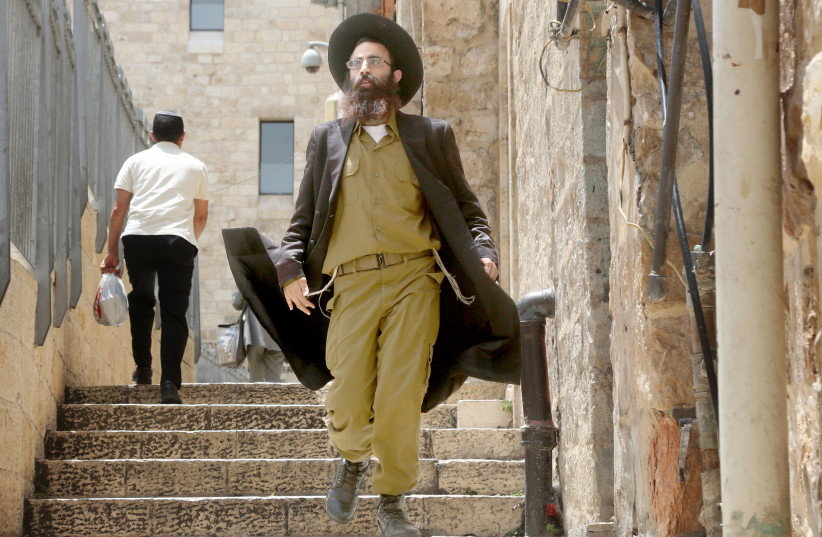A survey recently conducted among Israel's haredi (ultra-Orthodox) community has unveiled significant shifts in their attitudes toward Israeli society in light of the outbreak of the "Swords of Iron" War.
The survey, conducted by The Haredi Institute for Public Affairs through the polling company Askaria, offered insights into the evolving relationship between the community and the broader Israeli society.
Shared destiny with Israeli society
According to the survey, almost three-fourths (73%) of the haredi community believes that their sense of shared destiny with Israeli society has intensified with the recent war.
Furthermore, a full three-fourths expressed feeling a deep connection to what they referred to as the "Israeli narrative."

This newfound sense of belonging has paved the way for a significant portion – close to a third (32%) – to support increased involvement of their community in Israeli society.
The survey sample represented various segments of the haredi community, including both modern and more conservative perspectives, as well as taking into consideration age, employment, and geographical factors.
Increased support for haredi enlistment
One of the most notable findings was more than a tripling – from 9% to 29% – of support for haredi enlistment in the IDF.
Chabad exhibited the highest level of support by far at 74%, more than twice as much as the Sephardic community (36%), almost three times as much as the haredi-hassidic community (25%), and more than three times the Lithuanian-haredi community (20%).
Some 70% of respondents agreed that haredi individuals who do not study Torah should contribute to the country through IDF, national, or civilian service. This complements the 51% who disagreed with complete exemption from IDF service for haredim.
The survey also shed light on the impact of the war on personal security perceptions. About 58% of respondents reported that their sense of personal security had been affected by the war.
Additionally, 37% indicated they or their spouses were considering obtaining gun licenses in response to the heightened security concerns, while 20% were contemplating joining preparatory classes for IDF service.
Trust in public institutions
The IDF emerged as the most trusted institution among the haredi public, with a trust rating of 59%.
Political party representatives followed closely behind at 58%, primarily consisting of haredi Knesset members.
Local authorities ranked third in trustworthiness (48%), followed by the Israel Police (42%), and the government (34%).
The justice system received the lowest rating, with only 8% expressing trust.
Implications and reflections
Eli Paley, director of the Haredi Institute for Public Affairs, emphasized the long-term impact of recent events and urged policymakers to seize the historic opportunity presented by the survey results.
"The long-term effects of the events of October 7 require thorough examination and study," Paley said. "The changes indicated by the survey in the positions of many within the haredi community regarding Israeli society, as well as their understanding of the role in the haredi community in contributing to Israel's economic and security needs, represent a historic opportunity for decision-makers.
"The survey reflects a strong desire within the haredi public to be more involved and contribute in various areas," he said. "The challenge for the IDF and public institutions is to create tailored programs that will allow the haredi community a genuine opportunity for significant contribution."
Dr. Shai Shtern, the institute's deputy director, highlighted the disruption of fundamental assumptions within the community.
"The survey results show that, much like the broader Israeli society, the events of October 7 have impacted the haredi community and have disrupted the fundamental assumptions that have guided this community for decades," Shtern said.
"The survey reveals that a significant and growing portion of the haredi community wants to increase its involvement in various aspects of the state, seeing themselves as an integral part of Israeli society," he said. "The challenge now lies in creating tailored programs that enable the haredi community to make a meaningful contribution."
